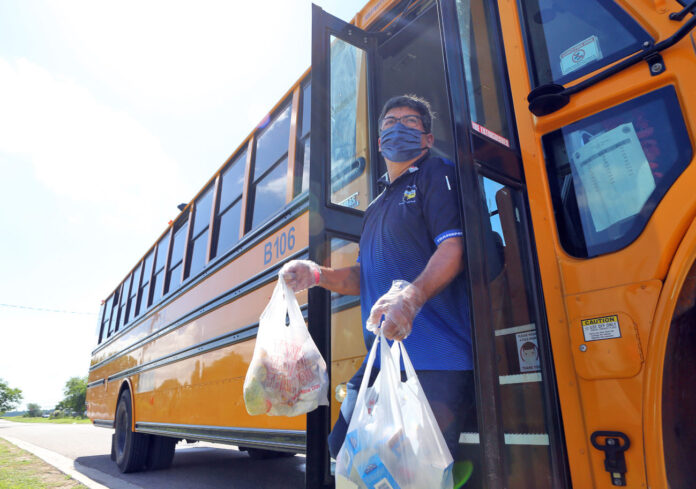EDINBURG — The last time Juan Heredia drove a school bus full of students, it was March.
Since the pandemic hit, the school bus driver of 10 years, along with nearly all of Edinburg CISD’s transportation personnel, haven’t been behind the big wheel — that was until the state approved of the district’s meal delivery program for students on Sept. 3.
Every morning since Monday, 128 buses have been making routes all around the city, making more than 300 stops in neighborhoods to deliver school supplies, devices and nearly 35,000 meals.
Additionally, for students who do not have the means to take part in online learning, bus drivers have been delivering lesson packets to their homes, picking up their homework and taking it back to teachers.
“This is so important because our primary function in transportation is bringing the kids to school for them to learn, but given the time we are going through with the pandemic, what we are doing is bringing the school to the kids,” said Eloy Pulido, the district’s coordinator for transportation.
Hundreds of breakfast and lunch sacks, along with dozens of lesson packets and devices are loaded onto Heredia’s school bus every morning, which he takes to a neighborhood about a half-hour commute away from Anne L. Magee Elementary School, where he works.
It’s a labor of love, he said, but he much rather have cheery students loading the bus.
Heredia said distributing meals and supplies gives him a chance to reunite with the kids he was used to seeing every day.
“I ask them about how they are doing and I could see that they were happy to see me again,” Heredia said. “I miss their smiles and saying good morning to them. I miss the kids, I miss them very much.”
The meal delivery program operates alongside the district’s curbside meal service, with both initiatives providing free meals to any child in the county.
School Board Member Dominga Vela said launching the delivery program was important for two reasons: much of the district’s student body lives in low-socioeconomic households that depended on school for meals, and Edinburg is a large, rural city.
According to the last census, nearly a quarter of city residents live below the poverty line, and operating a curbside program was not enough because many students live on the rural outskirts of the city, making it difficult for them to pick up meals.
ECISD covers 945 square miles of the county, which is a little smaller than Rhode Island.
“As the school district of the city, it is our duty to reach out to them,” said Vela, a former Edinburg teacher of 42 years. “We have to keep them fed so that we can keep them focused on their education…. Our bus transportation team has been the extension of the nucleus of ECISD to keep our students and parents going.”
Magee Elementary Principal Marla Cavazos grew up in a small town near Falfurrias, and said she understands the difficulties of many of her students.
The school’s enrollment is around 450 — a number she said fluctuates depending on the season of the year because many students come from migrant families.
“I can relate to them, I grew up with humble means and I know what kinds of difficulties they are going through,” Cavazos said, who has been the school’s principal for a decade. “I know what they need, and I know that the connection to school and teachers are so, so vital.”
She recalled that when she started at Magee, she addressed the school’s parents by telling them in an auditorium: “I’m here, and we are going to do this together, and there is not going to be any ‘I can’t do it’ because nobody gave up on me and I did not give up on myself, and neither are you, I am here to help you.”
Cavazos said her message has not changed.
“We are going to do whatever it takes to keep our students learning,” she said.




